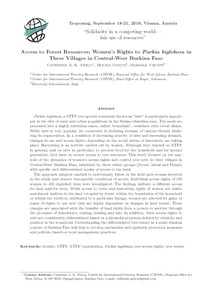Resource information
Parkia biglobosa, a NTFP tree species commonly known as "néré" is particularly important in the diet of rural and urban populations in the Sudano-Sahelian zone. The seeds are processed into a highly nutritious sauce, called "soumbala", combined with cereal dishes. While néré is very popular, its occurrence is declining because of various threats hindering its regeneration. In a condition of increasing scarcity of néré and increasing demand, changes in use and access rights, depending on the social status of harvesters, are taking place. Harvesting is an activity carried out by women. Although they depend on NTFP in general, and on néré in particular, to procure food for the household and for income generation, they have no secure access to tree resources. This study focused on the analysis of the dynamics of women's access rights and control over néré in three villages in Central-West Burkina Faso, inhabited by three ethnic groups (Nouni, Mossi and Fulani) with specific and differentiated modes of access to the land.
The approach adopted enabled to individually follow in the field each woman involved in the study and observe tree-specific conditions of access. Individual access rights of 180 women to 400 exploited trees were investigated. The findings indicate a different access for land and for trees. While access to trees and harvesting rights of women are stable and almost uniform in the land occupied by forest, within the boundaries of the household or within the territory attributed to a particular lineage, women are affected by gains or losses of rights to use néré that are highly dependent on changes in land tenure. These changes are associated with the transfer of land rights from a person to another through the processes of inheritance, renting, lending and sale. In addition, these access rights to néré are considerably differentiated based on a hierarchical system defined by ethnicity and position in the household. Understanding the differentiated tree tenure in a multi ethnical context of Burkina Faso will help to develop sustainable and equitable protection measures and policies, based on local management practices.




